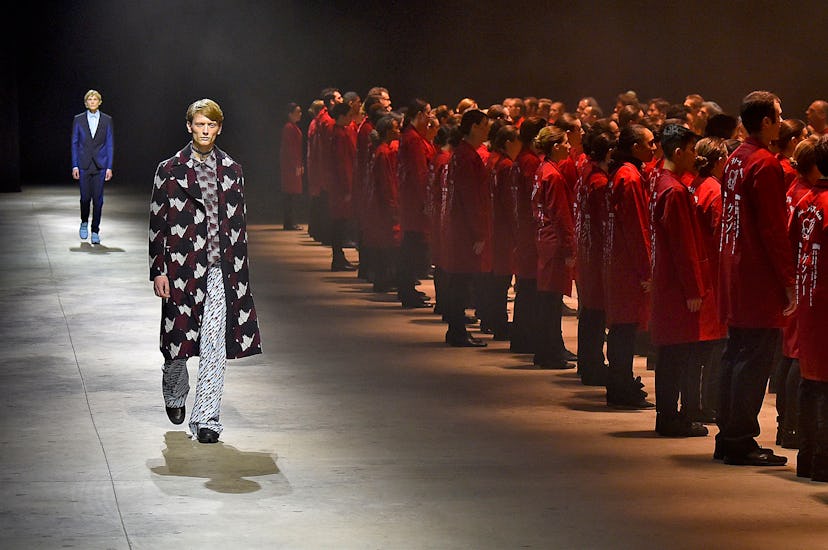Cambridge Analytica Used Fashion Propaganda in Its Pro-Trump Election Strategy
A whistleblower described the firm’s fashion-related tactics as “a weapon of mass destruction.”

Eight months after the news broke that Cambridge Analytica, a British political-marketing firm, exploited the data of 87 million Facebook users to aid Trump consultants in influencing the 2016 presidential election, another development broke in an unlikely place: Oxfordshire, England, where the Business of Fashion is currently holding its annual Voices conference. Along with Alber Elbaz, Michèle Lamy, and Stella McCartney, the guests on this year’s lineup include the whistleblower Christopher Wylie, who, upon taking the stage on Thursday morning, used the opportunity to break the news that, according to evidence he found, the firm’s strategy to aid Donald Trump‘s presidential campaign on the path to victory included weaponizing fashion brands.
“Fashion data was used to help [Steve] Bannon build the alt right,” Wylie said, explaining that a significant amount of the firm’s research was devoted to fashion, for the most part analyzing the capability of people’s stylistic and aesthetic preferences to indicate how susceptible a person might be to joining right-wing political parties. That may seem like a stretch, but fashion is, after all, often about identity and self-expression—something that the fashion industry itself of course uses to aid in sales and marketing.
Say, for example, you once “liked” the official Facebook page of a brand like Nike, Armani, or Louis Vuitton. You may have done so mindlessly—perhaps encouraged by Facebook to illustrate your interests on your profile, or simply to keep up with their posts. But to Cambridge Analytica, those “likes” spoke volumes about your personal character—enough, anyway, to decide whether or not to send political propaganda your way or give you up as a bad job.
The firm turns out to have apparently targeted political messaging with the help of a matrix that illustrated correlations between fashion brands and five psychological and personality traits: openness, conscientiousness, extraversion, agreeableness, and neuroticism. Those who “liked” American heritage brands like Wrangler and LL Bean, for example, were apparently more likely to be “conventional” and therefore to correlate with openness—a trait that the firm identified as signaling that they were more likely to respond to pro-Trump messages. If you happened to have “liked” Kenzo, though, you’re in luck: According to Cambridge Analytica, you’re less likely to be swayed by pro-Trump propaganda, and were therefore less worthy of their time. (Unsurprisingly so, given that the brand has become increasingly progressive—for example, using its runway casting to champion multiculturalism—under the helm of Carol Lim and Humberto Leon, the designers also behind Opening Ceremony’s politically charged fashion shows.)
It’s no small matter that Wylie used the term “weapon of mass destruction” to describe the firm’s unsuspectingly fashion-driven approach. His tenure working for Steve Bannon—who was executive chairman at Brietbart News when the outlet attempted to install a fashion critic—as well as a military contractor for the Pentagon, NATO, and the U.K.’s Ministry of Defense, also led him to identify the firm’s weapons as more suited to military assets, which they then turned into ammunition on ordinary citizens via algorithms and narratives, used to determine their use of payloads, or transmitted data, and targeting systems. To Wylie, there was only one key difference between Facebook and the NSA: “The NSA’s targets are extremists, foreign spies,” he said, whereas “on Facebook, you are the target.”
Christopher Wylie, speaking about Cambridge Analytica at the *Business of Fashion*’s 2018 Voices conference in Oxfordshire, England.
Whether or not your “likes” actually are as indicative as the alt right’s preference for white polo shirts traditionally favored by skinheads, or, to cite another one of Wylie’s examples, as forthright messages as Maoist and Nazi uniforms, that of course doesn’t change the fact that the firm acted on that impulse. It may be worth your time to go through your own likes on Facebook—if only, at the very least, to ponder what Cambridge Analytica would have deduced from you “liking” Vetements.
Related: No, Breitbart News Doesn’t Have a Fashion Critic
Hooray for Kenzo, Which Cast All Asian Models for Its Summer 2018 Men’s and Women’s Show
A model walks the runway at the Summer 2018 Kenzo men’s and women’s runway show at Paris Fashion Week in France.
A model walks the runway at the Summer 2018 Kenzo men’s and women’s runway show at Paris Fashion Week in France.
A model walks the runway at the Summer 2018 Kenzo men’s and women’s runway show at Paris Fashion Week in France.
A model walks the runway at the Summer 2018 Kenzo men’s and women’s runway show at Paris Fashion Week in France.
A model walks the runway at the Summer 2018 Kenzo men’s and women’s runway show at Paris Fashion Week in France.
A model walks the runway at the Summer 2018 Kenzo men’s and women’s runway show at Paris Fashion Week in France.
A model walks the runway at the Summer 2018 Kenzo men’s and women’s runway show at Paris Fashion Week in France.
A model walks the runway at the Summer 2018 Kenzo men’s and women’s runway show at Paris Fashion Week in France.
A model walks the runway at the Summer 2018 Kenzo men’s and women’s runway show at Paris Fashion Week in France.
A model walks the runway at the Summer 2018 Kenzo men’s and women’s runway show at Paris Fashion Week in France.
A model walks the runway at the Summer 2018 Kenzo men’s and women’s runway show at Paris Fashion Week in France.